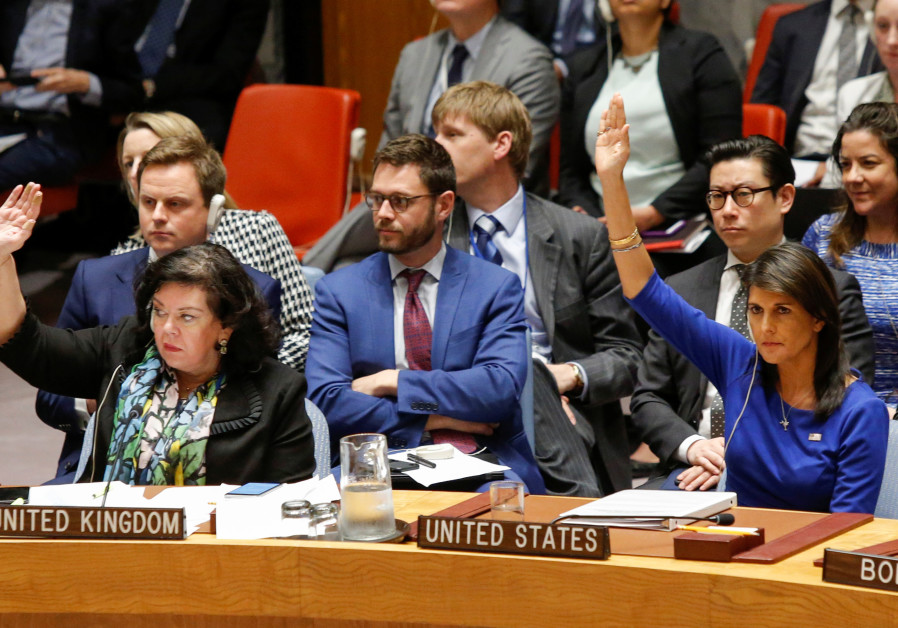T. Belman. When Trump said that the US was only in Syria to defeat ISIS, I disagreed. I am happy that Haley corrected the record.
Haley acknowledged regional concerns and said, “We all know our work in Syria is not done.”
Deterring Iran’s entrenchment in Syria is one of US President Donald Trump’s top three priorities there, guiding his policy on where to station troops in the war-torn country and for how long, US Ambassador to the UN Nikki Haley said on Sunday.
Her statement comes amid reports of strains between the Trump administration and Prime Minister Benjamin Netanyahu’s government over the US role in providing a buffer between Iranian troops and Israel’s border. Trump in recent weeks has vowed to pull US troops out of Syria entirely, prompting alarm in Jerusalem that Israel’s fight against Iran would be waged alone.
Netanyahu, in a telephone conversation Saturday evening with British Prime Minister Theresa May, whose country joined the US and France in Saturday’s missile strike on Syria, stressed that Iran is the leading source of instability in the region, and that Syrian President Bashar Assad needs to understand that when he lets Iran build a permanent presence for itself and its proxies in Syria, he is endangering Syria and the entire region.
Netanyahu discussed his phone conversation with May at the start of Sunday’s cabinet meeting. He said he told her the same resolve the US, Britain and France showed in standing up to Assad’s use of chemical weapons now needs to be shown in preventing terrorist states and organizations from getting nuclear capabilities.
Trump has given the European powers – France, Britain and Germany – until May 12 to fix the Iranian nuclear agreement that was signed in 2015. He has warned that if it is not satisfactorily altered, he will walk away from the deal.
US, British and French forces pound Syria with air strikes early on Saturday in response to a poison gas attack, April 14, 2018(Reuters)
Israel fully supports Trump’s decision to act against Assad’s use of chemical weapons, Netanyahu reiterated, adding that Jerusalem welcomes the French and British participation in the mission.
He said he told May that “the important international message that was given with the attack was zero tolerance for the use of nonconventional weapons.”
Haley, in interviews with news shows on Sunday morning, touted the success of the joint strike that sought to punish Assad for his use of chlorine and sarin gases against civilians in the town of Douma on April 7.
The strike was prompted by the president’s commitment to prevent the normalization of chemical-weapons use, she said, calling it a top priority of his administration.
A second priority, Haley said, was the complete defeat of Islamic State forces that once held territory in Syria.
“Then, thirdly, we want to make sure that the influence of Iran doesn’t take over the area,” she said on CBS’s Face the Nation. “They continue to cause problems throughout the region, and we want to make sure that there is a hold.”
The allied strike on Assad’s chemical-weapons infrastructure “set their program back years,” Haley said. She ruled out direct US talks with Assad over ending the conflict because of his “brutality” in targeting innocents throughout the course of the war.
Haley said the operation was not intended to overthrow the embattled dictator or “start a new war” in a country now seven years into a bloody conflict among forces loyal to Assad, opposition groups and terrorist organizations. It was meant to send a message that “the president is watching,” she said, adding that Assad “now dictates his own life.”
REGIONAL POWERS responded to the strike with a collective shrug, and even the Pentagon acknowledged the attack would not necessarily prevent Assad from continuing to deploy chemical weapons.
Haley acknowledged regional concerns in her interviews and said, “We all know our work in Syria is not done.”
Saturday morning’s precision strike volleyed more than 100 missiles at three targets that US officials said were critical to Assad’s chemical-weapons program, including a research and development center, processing facilities and storage facilities.
“This was not muscle flexing,” Haley told CBS’s Margaret Brennan. “We set their chemical-weapons program back years.”
Intelligence Minister Israel Katz, meanwhile, denied in a Kan Bet interview that Assad’s Russian allies had passed on a message to Israel that as a result of the American-led attack, Russia would take action to limit Israel’s movement over Syrian airspace.
Russia would be making a mistake if it supplied Syria with S-300 surface-to-air missile systems, he said.
Israel’s position on this is well known to the Russians, Katz said, and was discussed with Putin for years by former prime ministers Ariel Sharon and Ehud Olmert, and then again by Netanyahu, in the context of preventing Moscow from selling these advanced air-defense systems to Iran. Russia eventually did sell Iran the weapons system, he said, but only after the Iranian nuclear deal was signed in 2015.
Putin understands very well the significance of providing those weapons systems and “challenging Israel,” Katz said. “He understands very clearly that for Israel the most important thing is that it is determined to act in Syria, and I think that Russia does not have the right to prevent Israel from defending itself against countries and organizations that are working against the existence of the State of Israel.”




Leave a Reply
You must be logged in to post a comment.